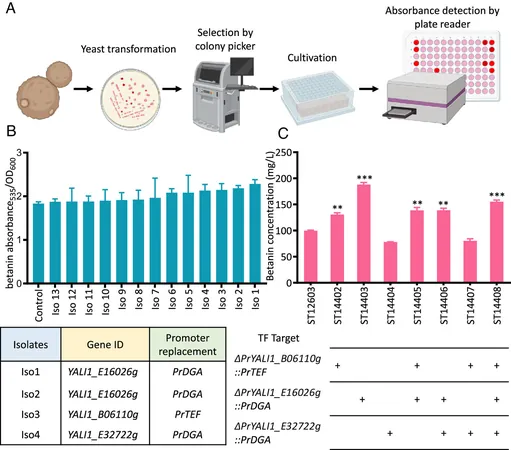
Revolutionizing Yeast Engineering: A Game-Changer for Industrial Biotechnology
2025-06-23
Author: Ming
A Breakthrough in Genetic Engineering
Researchers at DTU Biosustain have unveiled a groundbreaking toolkit that transforms the genetic engineering process of yeast strains crucial for industrial biotechnology. Published in the prestigious *Proceedings of the National Academy of Sciences*, this innovation promises to fast-track developments across various biotechnological sectors.
Introducing TUNEYALI: The Future of Strain Optimization
Named TUNEYALI, this tool allows scientists to precisely adjust gene expression in microbial cell factories, significantly slashing both the time and costs often linked to strain optimization. This advancement, spearheaded by researchers Wei Jiang, Shengbao Wang, and Professor Irina Borodina, stands to revolutionize applications ranging from pharmaceuticals to sustainable agriculture.
Efficiency Meets Precision
Wei Jiang stated, "Our goal was to streamline strain engineering without losing accuracy. With TUNEYALI, we can quickly test and pinpoint the best-performing yeast strains, facilitating the development of large-scale production systems." This toolkit paves the way for more efficient industrial applications.
Transforming Industrial Biotechnology
In the realm of industrial biotechnology, yeasts like Saccharomyces cerevisiae and Yarrowia lipolytica are engineered to create high-value products via fermentation, such as insulin, omega-3 fatty acids, and even sweeteners like stevia. Traditionally, the optimization process has been painfully slow and resource-heavy.
Modular and Iterative Engineering
TUNEYALI tackles these challenges head-on with a modular and iterative approach to gene expression control. By constructing a library of promoters to replace native ones in front of target genes, researchers can efficiently screen and select the most effective genetic modifications.
Expanding Horizons: The Power of Adaptability
As part of this study, the team created a promoter library focused on 56 transcription factors, each designed to operate at seven different expression levels. When applied to Y. lipolytica, this innovative toolkit enabled rapid selection of yeast strains exhibiting improved thermotolerance, altered morphology, and enhanced production of betanin, a vibrant red food coloring derived from beets. Shengbao Wang emphasized the versatility of TUNEYALI, stating, "It goes beyond just transcription factors; it can extend to entire metabolic pathways and various strain development initiatives."
Open Science Initiative
In a move to promote open science, the researchers have made TUNEYALI and its libraries accessible to the public through AddGene, a nonprofit repository. This decision aims to foster further innovations in metabolic engineering and beyond.
Who Benefits from TUNEYALI?
This cutting-edge toolkit is particularly beneficial for metabolic engineering researchers working with unconventional yeasts, biotech companies engaged in yeast-based chemical production, and biofoundries focused on scalable, high-throughput strain optimization.
A Broader Vision for Biotechnology
Professor Irina Borodina points out that the implications of TUNEYALI are not merely confined to yeast; this innovative system holds potential for a vast array of microbial platforms, shaping the future of biotech with its promise of easier, faster, and more efficient strain optimization.


 Brasil (PT)
Brasil (PT)
 Canada (EN)
Canada (EN)
 Chile (ES)
Chile (ES)
 Česko (CS)
Česko (CS)
 대한민국 (KO)
대한민국 (KO)
 España (ES)
España (ES)
 France (FR)
France (FR)
 Hong Kong (EN)
Hong Kong (EN)
 Italia (IT)
Italia (IT)
 日本 (JA)
日本 (JA)
 Magyarország (HU)
Magyarország (HU)
 Norge (NO)
Norge (NO)
 Polska (PL)
Polska (PL)
 Schweiz (DE)
Schweiz (DE)
 Singapore (EN)
Singapore (EN)
 Sverige (SV)
Sverige (SV)
 Suomi (FI)
Suomi (FI)
 Türkiye (TR)
Türkiye (TR)
 الإمارات العربية المتحدة (AR)
الإمارات العربية المتحدة (AR)